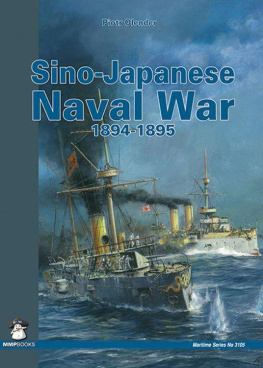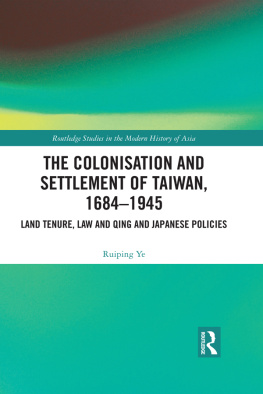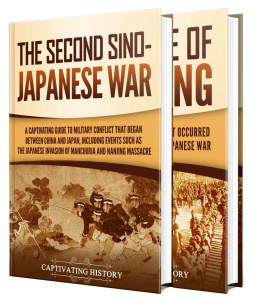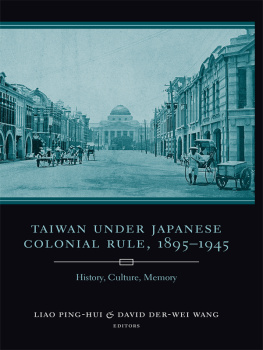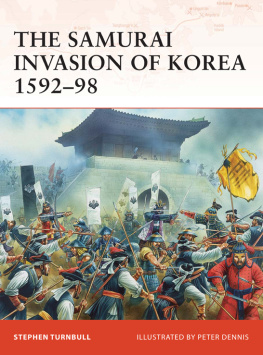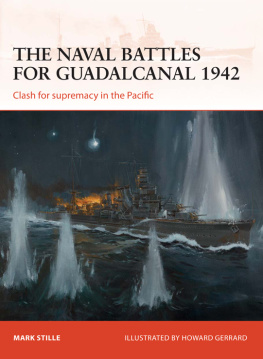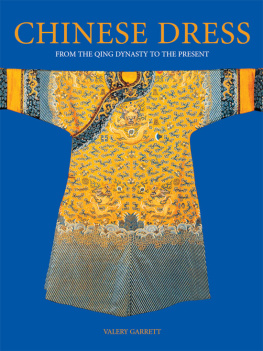Chinese names index (in the Wade-Giles and pinyin transcription)
Amoy (town) present day Xiamen
Antung (town, Manchuria) Andong
Chaopeitsui (fort, Weihaiwei) Zhaobeizui
Changhaokoutse (town, Shantung) Zhanghaogouze
Changfungse (town near Weihaiwei) Zhangfungse
Changkouai (Changhutai; town in Manchuria) Zhangouai
Chefoo (Chihfu; town, Shantung) Zhifu
Chekiang (Chechiang; province) Zhejiang
Ching (dynasty) Quin
Chihli (province) Zhili
Chiuliencheng (town, Manduria) Jiuliancheng
Chihsutai (Fort, Weihaiwei) Zhisudai
Chun (Chun Ching; Grand Prince) Chun
Chungkou (bay near Weihaiwei) Zhungou
Cinampo (Chinampo, Chinnampo; bay) Jinnambo
Fang Pai-chien (Cpt) Fang Baiqian
Fenghuangcheng (town, Manchuria) Fenghuangcheng
Fengtao (Pungdo, Phungdo; island) Fengdao
Foochow (town, Fukien) Fuzhou
Fuchou (town, Manchuria) Fuzhou
Fukien (province) Fujian
Foulingtse (town near Weihaiwei) Foulingze
Haicheng (town, Manchuria) Haicheng
Haichuan (island, Fukien) Haiquan
Haiyang (island, the Yellow Sea) Haiyang
Hanchou (town, Chekiang) Hanzhou
Hsiehchiaoso (fort, Weihaiwei) Xiejiaosou
Hsien Feng (Emperor) Xianfeng
Hsinchiang (East Turkestan; province) Xinjiang
Hsiuyan (town, Manchuria) Xiuyan
Hsiyu (island, the Pescadores) Xiyou
Huang (island and fort, Weihaiwei) Huang
Huangtuya (fort, Weihaiwei) Huangduya
Hoanpu (harbour) Heanbu
Huayuankou (town, bay, South Manchuria) Huayuankou
Hunho (Hun; river, Manchuria) Hunhe
Hushan (town in Manchuria) Hushan
Hushan (town near Weihaiwei) Hushan
I Ko-tang (General) Yi Ketang
Jih (island and fort, Weihaiwei) Ri
Jungcheng (bay and town, Shantung) Rongcheng
Kaiping (town, Manchuria) Gaiping
Kanchou (Canton, town) Ganzhou
Kangwangchai (town, Manduria) Ganwangzhai
Keelung (town, Taiwan) Jilong
Keitoutsai (town, Shantung) Geidouzai
Keming (island, Shantung) Geming
Kiangsu (Chiangsu; province) Jiangsu
Kinchou (town, Manduria) Kinzhou
Kufangting (fort, Weihaiwei) Kufangding
Koupei (fort, Weihaiwei) Goubei
Kungpe (fort, the Pescadores) Gongbe
Kushanhao (town, Shantung) Gushanhao
Kwangtung (Kuangtung; province) Guangdong
Kwangsi (Kuangsi; province) Guangxi
Laotaokou (town near Weihaiwei) Laodaogou
Li Hung-chang (politician) Li Hongzhang
Liaoho (Liao; river, Manchuria) Liaohe
Liaoyang (town, Manchuria) Liaoyang
Lichangchiao (bay, the Pescadores) Lizhangjiao
Liu Ku-i (Governor General of Liangchiang) Liu Kuyi
Liukung (island and fort, Weihaiwei) Liugong
Lukeitsui (fort, Weihaiwei) Lugeizui
Lungmaotsui (fort, Weihaiwei) Longmaozui
Lu Yung-fu (General) Lu Yongfu
Makung (town, the Pescadores) Magong
Motienling (town, Manchuria) Modianling
Motienling (fort, Weihaiwei) Modianling
Mu Ta-cheng (General) Mu Dazheng
Mukden (town, Manchuria) Mukden
Nankin (town, Kiangsu) Nanjing
Nanyang (fleet) Nanyang
Nieh Shih-cheng (General) Nie Shicheng
Ningpo (town) Ningbo
Niuchuang (town, Manchuria) Niuzhuang
Paiting (fort, Weihaiwei) Paiding
Panchiatai (town, Manchuria) Banjiadai
Paohua (town, Shantung) Baohua
Peiho (Pei; river, Chihli) Beihe
Peishantsui (fort, Weihaiwei) Beishantsui
Peiyang (fleet) Beiyang
Peking (Pekin, Peiching; the capital of China, Chihli) Beijing
Penghu (island, the Pescadores) Penghu
Pochihyasu (town near Weihaiwei, Shantung) Bozhiyasu
Saimachi (town, Manduria) Saimaji
Santiaochiao (cape Taiwan) Sandiaojiao
Shanghai (town, Kiangsu) Shanghai
Shantung (province) Shandong
Shanhaikuan (town, Chihli) Shanhaiguan
Shihkaoho (town, Shantung) Shigaohe
Sikiang (river) Xi Jiang
Sumucheng (Hsiumucheng; town, Manchuria) Sumuzheng (Xiumuzheng)
Sung Chinga (General) Sung Quing
Swatou (Shantou, Suatao; town, Kwangtung) Shandou
Tai Ping (Eternal Happiness) Dai Bing
Taipei (town, Taiwan) Taibei
Taiwan (island) Taiwan
Taku (harbour, Chihli) Dagu
Takushan (town, Manchuria) Dagushan
Tamsui (town, Taiwan) Tamsui (Huwei)
Tang Ching-sung (Governor of Taiwan) Dang Jingsong
Tayang (river, Manchuria) Dayang
Tienchuangtai (town, Manchuria) Tianzhuangtai
Tientsin (town, Manchuria) Tianjin
Tengchou (town, Manchuria) Dengzhou
Tsaohokou (town, Manchuria) Zaohegou
Tseng Kuo-fan (politician) Zeng Guofan
Tso Tsung-tang (politician) Zuo Zongtang
Tsu Hsi (widow Empress) Cu Xi
Tsuichiafang (town, Manchuria) Zuijiafang
Tukou (bay, Weihaiwei) Dugou
Tungchou (town and harbour, Shantung) Dongzhou
Tunghungshao (fort, Weihaiwei) Donghongshao
tzu chiang (Self-Strengthening Policy) zi quiang
Weihaiwei (bay and harbour, Shantung) Weihaiwei
Wusung (town) Wusong
Wuchiu (island, Fukien) Wujiu
Yangheatun (town near Weihaiwei)
Yangtze (river) Yangzi
Yantai (town, Shantung) Yantai
Yeh Chih-chao (General) Ye Zhichao
Yungfangling (fort, Weihaiwei) Yongfangling
Yingkou (town, Manchuria) Yingkou
Yinshankou (bay, Shantung) Yinshangou
Published in Poland in 2014
by STRATUS s.c.
Po. Box 123,
27600 Sandomierz 1, Poland
e-mail:
for
Mushroom Model Publications,
3 Gloucester Close,
Petersfield
Hampshire GU32 3AX, UK
e-mail:
2014 Mushroom Model Publications.
http://www.mmpbooks.biz
All rights reserved. Apart from any fair dealing for the purpose of private study, research, criticism or review, as permitted under the Copyright, Design and Patents Act, 1988, no part of this publication may be reproduced, stored in a retrieval system, or transmitted in any form or by any means, electronic, electrical, chemical, mechanical, optical, photocopying, recording or otherwise, without prior written permission. All enquiries should be addressed to the publisher.
ISBN
978-83-63678-30-2
Editor in chief
Roger Wallsgrove
Editorial Team
Bartomiej Belcarz
Robert Pczkowski
Arthur Juszczak
Matthew Willis
Scale plans
Robert Panek
Maps
Piotr Olender
Cover
Grzegorz Nawrocki
Translation
Kazimierz Zygado
Layout
Artur Juszczak
Printed by
Drukarnia Diecezjalna,
ul. eromskiego 4,
27600 Sandomierz
www.wds.pl
PRINTED IN POLAND
Sources of illustrations: Eastlake F.W., Yamada Y., Heroic Japan. A history of the War between China & Japan, London 1897; Graphic; Illustrated London News; Inouye J., The Japan-China War, vol. I-III, Yokohama 1895; http://kreiser.unoforum.ru/; Ships of the Imperial Japanese Navy, SW No. 500 (1995).
| T able of contents
In the mid 19th century, China and Japan, with their populations of 400 and 4445 million people respectively, were the largest countries in the Far East. Despite their differences, they shared numerous similarities. Both were fairly well-developed feudal states where social and economic conditions were comparable to those of medieval Europe. In both countries, the emperor, surrounded by the aura of divinity, held supreme power. In reality, that power was limited by the influence of local feudal lords and officials. Finally, both countries adopted policies of isolationism, locking themselves away from the outside world in the belief of their own superiority and perfection. Both China and Japan had contact with European countries in the 16th century and had even traded with them, but these relationships were limited and subject to severe restrictions.

